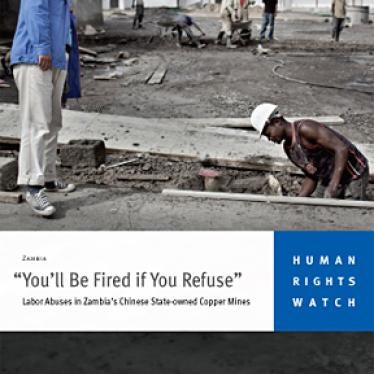(Lusaka) – Chinese-run copper mining companies in Zambia routinely flout labor laws and regulations designed to protect workers’ safety and the right to organize, Human Rights Watch said in a report released today. Zambia’s newly elected president, Michael Sata, a longtime critic of the Chinese labor practices, should act on his campaign promises to end the abuse and improve government regulation of the mining industry to ensure that all companies respect Zambia’s labor laws.
The 122-page report, “‘You’ll Be Fired If You Refuse’: Labor Abuses in Zambia’s Chinese State-owned Copper Mines,” details the persistent abuses in Chinese-run mines, including poor health and safety conditions, regular 12-hour and even 18-hour shifts involving arduous labor, and anti-union activities, all in violation of Zambia’s national laws or international labor standards. The four Chinese-run copper mining companies in Zambia are subsidiaries of China Non-Ferrous Metals Mining Corporation, a state-owned enterprise under the authority of China’s highest executive body. Copper mining is the lifeblood of the Zambian economy, contributing nearly 75 percent of the country’s exports and two-thirds of the central government revenue.
“China’s significant investment in Zambia’s copper mining industry can benefit both Chinese and Zambians,” said Daniel Bekele, Africa director at Human Rights Watch. “But the miners in Chinese-run companies have been subject to abusive health, safety, and labor conditions and longtime government indifference.”
The report is based on research conducted during three field missions in November 2010 and July 2011 and draws on more than 170 interviews, including with 95 mine workers from the country’s four Chinese copper operations and 48 mine workers from other multinational copper mining operations. Miners at Chinese-run firms said they were pleased that the companies had made a substantial investment in the copper mines and created jobs. But they described abusive employment conditions that violate national and international standards and fall short of practices among other multinational copper mining companies in the country.
“Sometimes when you find yourself in a dangerous position, they tell you to go ahead with the work,” an underground miner at Non-Ferrous China Africa (NFCA) told Human Rights Watch. “They just consider production, not safety. If someone dies, he can be replaced tomorrow. And if you report the problem, you’ll lose your job.”
Between October 5 and October 12, 2011, miners at three of the four Chinese-run copper mining operations initiated strikes, hopeful that the new government’s election would create an environment for improved conditions. Production ground to a halt. On October 19, Non-Ferrous China Africa, the longest-operating Chinese-owned copper mine, fired at least 1,000 striking workers. After government pressure in subsequent days, NFCA agreed to reinstate them. Reuters reported that NFCA’s chief executive officer said that the reinstated workers would be screened and the “troublemakers” disciplined.
Miners from the Chinese-owned companies described consistently poor health and safety standards, including inadequate ventilation that can lead to serious lung diseases, the failure to replace workers’ damaged protective equipment, and routine threats to fire workers who refuse to work in unsafe places underground. These practices, combined with the already dangerous nature of copper mining, cause injuries and other health complications. At times, Chinese managers bribe or threaten miners to keep them from reporting accidents or other problems to the government’s Mines Safety Department, the miners said.
“Many of the poor health and safety practices we found in Zambia’s Chinese-run mines look strikingly similar to abuses we see in China,” Bekele said. “Respecting labor laws and ensuring workers’ safety should be standard operating practice both in China and abroad, not treated as an irritating barrier to greater profits.”
In addition to their poor safety standards, several Chinese-run copper operations in Zambia require miners to work brutally long shifts, despite difficult conditions involving extreme heat and contact with acids and noxious chemicals. Many miners at Sino Metals work five 12-hour shifts a week as well as a sixth 18-hour “change shift” when they rotate from the day shift to the night shift or vice versa. Other miners there described working 365 days without a single day off. Zambian law specifies a 48-hour work week, and every other multinational copper mining company uses 8-hour shifts that comply with this law. Several miners said the long hours contributed to accidents, and many complained about failing to receive proper overtime.
The curtailment of union activity hampers the ability to address these and other issues of concern to workers – particularly pay, which is higher than Zambia’s monthly minimum wage, but much lower than that paid by other multinational copper mining firms in Zambia. Several Chinese-run operations have prevented workers from exercising their right to join the labor union of their choice through threats and intimidation. Miners in companies run by the Chinese or other multinationals also described retaliation against outspoken union representatives, including docked pay or refusal to renew their contracts.
China Non-Ferrous Metals Mining Corporation provided a detailed reply to a Human Rights Watch letter summarizing the report’s main findings, which is annexed to the report.
While there have been improvements on many labor issues since the Chinese companies first started operations in 2003, they still fail to meet the standards of both labor law and their multinational competitors in Zambia’s copper industry, Human Rights Watch said. Miners now periodically receive personal protective equipment, which previously was not provided systematically or in its entirety. But the equipment is still generally not replaced when damaged during work, leading to unnecessary accidents and health problems. After years of pressure from the unions and government, first aid kits and ambulances have been added to respond to serious injuries – though workers said first aid kits taken underground are often incomplete because managers are careless about safety.
“Recent improvements show that Chinese companies will abide by labor laws when the Zambian government fulfills its responsibility to protect workers’ rights,” Bekele said. “But while Zambia’s mining laws are strong on paper, the government has failed to enforce them.”
Primary responsibility for ensuring that Zambia’s copper mining companies operate in accordance with national and international standards rests with the Zambian government. It has a Mines Safety Department within the Ministry of Mines and Minerals Development that is responsible for enforcing the country’s mining regulations, including on health and safety.
However, the department is understaffed, underfunded, and accused by miners of being corrupt – leaving it almost wholly ineffective. It performs virtually no proactive inspections and because of budget constraints, at times requires companies that are to be investigated to pay for transportation and other costs. The fines it is allowed to impose are so low that they have almost no deterrent effect, Human Rights Watch said.
The Labor Ministry has routinely endorsed collective bargaining agreements containing provisions that conflict with Zambian and international labor law. It has also failed to take action against companies that commit prejudicial acts against union representatives.
“Rather than simply blame Chinese-run firms, President Sata needs to ensure that his government is effectively protecting workers’ rights,” Bekele said. “More stringent measures are needed against all companies that flout labor laws and mining regulations.”
Personal Accounts
On health and safety, a boom operator at NFCA’s underground copper mine:
We are working in very bad conditions, horrible conditions. After a blast, it takes an hour for the dust, gases, and fumes to move out of the area. We’re supposed to wait to go in. But with the Chinese, they say, “Go, go, rush right away!” And if you don’t, they’ll terminate your contract. So we go straight into an area full of fumes and dust…. The doctor said that these gases have caused my ulcers and chest pain.
On health and safety,an underground drill operator at NFCA:
One day we had already [drilled] past where the support stopped, and I didn’t think it was safe to go farther without building more support. When I got my next paycheck I saw that I was marked absent. When I confronted the Chinese boss about it, he yelled at me and said I didn’t do my job. And he told me to quit. I’m worried now that when my contract comes up, they won’t renew me. So in the future, I’ll just have to go ahead with the work, no matter how unsafe. Otherwise I’ll lose my job.
On health and safety, a “casual” (temporary worker) at Sino Metals, referring to the company’s requirement that casuals provide their own protective equipment:
The Chinese bosses don’t give us respirators or hard hats – nothing. We must provide our own safety equipment or go without. I have had chest pain, head pain, yet I don’t have medical care with the company either. There is no PPE for casuals. The national union has been written [about this], but nothing has been done…. It’s so bad that, when Rupiah [former President Banda] came to the plant in March [2011], they put us in a room and locked it…. I heard later that some other casuals had been told to stay home that day. But we were there at the plant. And they took us into a room and locked it while the president was there, to keep us out of his sight.
On hours at work, a miner who works in the leach pad at Sino Metals:
It’s difficult to handles these hours. We work 12 hours a day, five days, and 18 hours on the day of the change shift. It’s very tiring.… And we never get a break; they say it’s a continuous operation, so no break. It’s very tough. If we eat, we have to while we work, or have a friend cover for a few minutes. There are times where you’re just so tired. And after transport to and from work, it’s 14 hours at least. My life is only my work here.
Overtime is supposed to be four hours every day. But it doesn’t make sense in terms of the pay.… Last month I received less than 200,000 [Kwacha, or US$42] for overtime. Yet I put in 30 hours of overtime every week! They don’t tell us how they calculate this, they refuse…. Our hours are too long for the pay we receive.
On anti-union activities, a union representative at Sino Metals:
The Chinese don’t understand the concept of a union. They intimidate those that lead or are part of a union. If they know you’re a representative, you’ll encounter problems, they’ll try to frustrate you until you leave the job.
On anti-union activities, a union representative at NFCA:
Several times I’ve been harassed and intimidated because of my union ties. I was forcibly transferred [to another department] … much farther from where meetings are organized and held…. [Several months later], they charged me for attending a meeting, which is directly against the law. The manager claimed that I did not have permission from the immediate supervisor, even though I had received it…. My supervisor said the instructions came from above … that the Chinese manager “insisted that I charge you.” I could be fired for the next [charge], so it is a way to keep me from my union duties. The Chinese don’t give any respect to the union, they see us as enemies.







